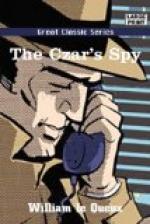That I had enemies I knew quite well. The man who believes he has not is an arrant fool. There is no man breathing who has not an enemy, from the pauper in the workhouse to the king in his automobile. But the unseen enemy is always the more dangerous; hence my deep apprehensive reflections that day as I walked those sordid back streets “over the water,” as the Cockney refers to the district between those two main arteries of traffic, the Waterloo and Westminster Bridge Roads.
My unknown enemies had secured the services of Olinto in their dastardly plot to kill me. With what motive?
I wondered as I crossed Waterloo Bridge to the Strand, whether Olinto Santini would again approach me and make the promised explanation. I had given my word not to prejudge him until he revealed to me the truth. Yet I could not, in the circumstances, repose entire confidence in him.
When one’s enemies are unknown, the feeling of apprehension is always much greater, for in the imagination danger lurks in every corner, and every action of a friend covers the ruse of a suspected enemy.
That day I did my business in the city with a distrust of everyone, not knowing whether I was not followed or whether those who sought my life were not plotting some other equally ingenious move whereby I might go innocently to my death. I endeavored to discover Olinto by every possible means during those stifling days that followed. The heat of London was, to me, more oppressive than the fiery sunshine of the old-world Tuscany, and everyone who could be out of town had left for the country or the sea.
The only trace I found of the Italian was that he was registered at the office of the International Society of Hotel Servants, in Shaftesbury Avenue, as being employed at Gatti’s Adelaide Gallery, but on inquiry there I found he had left more than a year before, and none of his fellow-waiters knew his whereabouts.
Thus being defeated in every inquiry, and my business at last concluded in London, I went up to Dumfries on a duty visit which I paid annually to my uncle, Sir George Little. Having known Dumfries since my earliest boyhood, and having spent some years of my youth there, I had many friends in the vicinity, for Sir George and my aunt were very popular in the county and moved in the best set.
Each time I returned from abroad I was always a welcome guest at Greenlaw, as their place outside the city of Burns was called, and this occasion proved no exception, for the country houses of Dumfries are always gay in August in prospect of the shooting.
“Some new people have taken Rannoch Castle. Rather nice they seem,” remarked my aunt as we were sitting together at luncheon the day after my arrival. “Their name is Leithcourt, and they’ve asked me to drive you over there to tennis this afternoon.”
“I’m not much of a player, you know, aunt. In Italy we don’t believe in athletics. But if it’s out of politeness, of course, I’ll go.”




